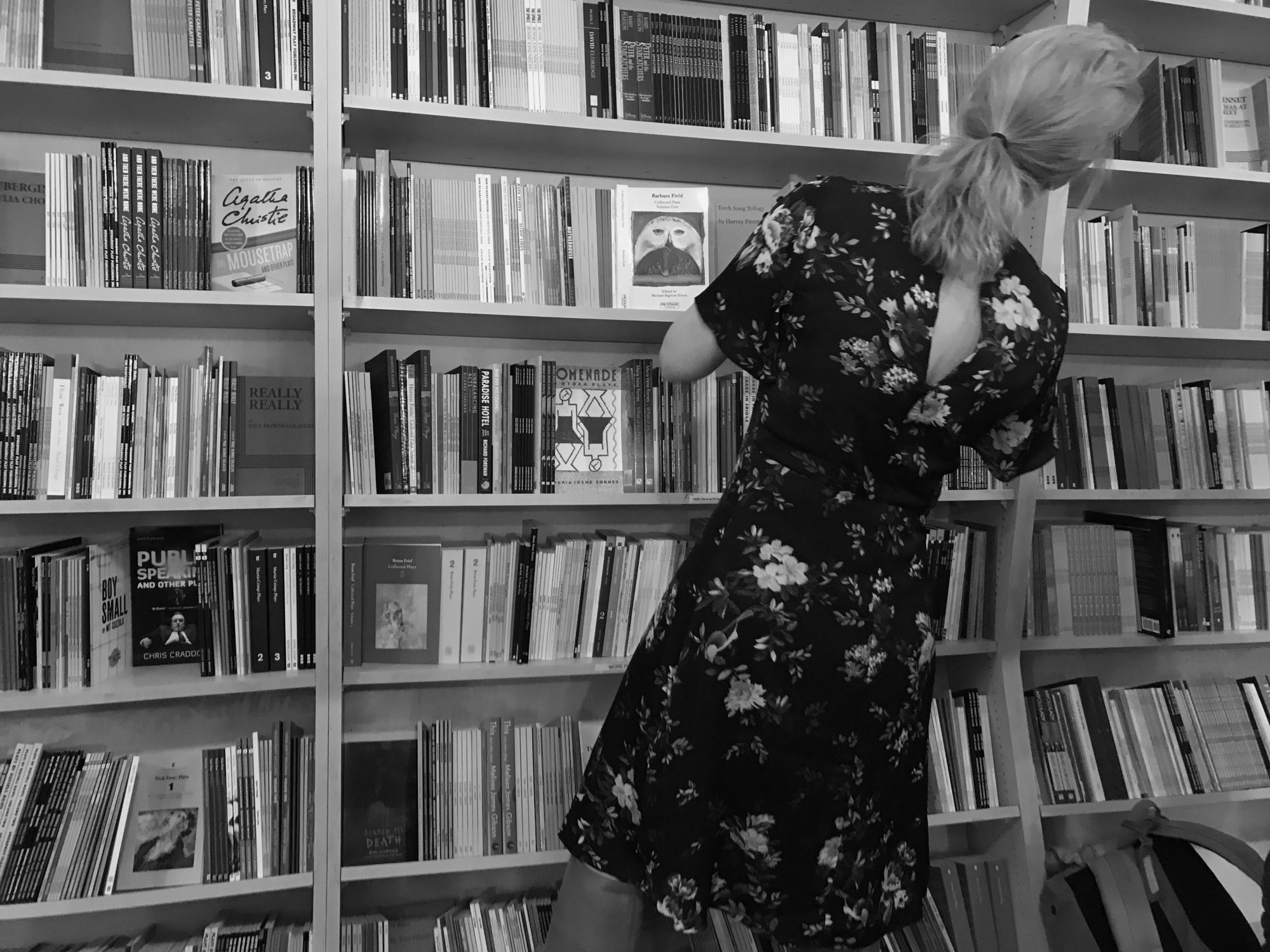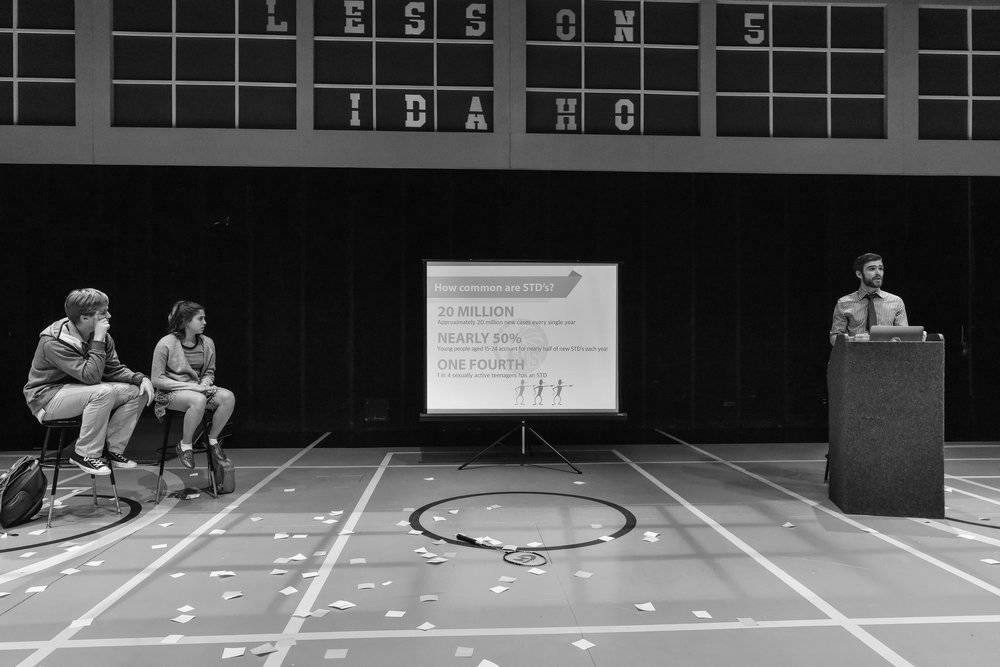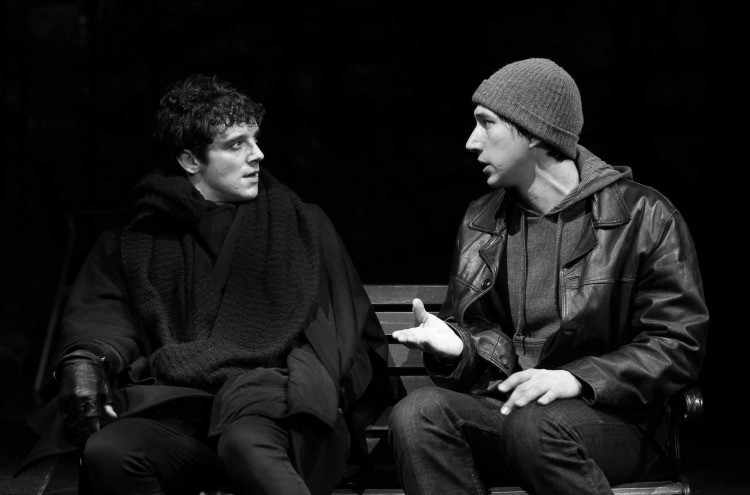Brothers, Bands, and Bombs: Theatrical Perspectives on World War II

American culture always seems to have a fixation on World War II and the succeeding years. Something about the 1940s seems to encapsulate everything that the United States has been and what has become the core of what we see as American, a kind of shared nostalgia for great, intense, fascinating times. In general, the United States views World War II as a good thing: it united the people for a shared purpose, reinvigorated the economy after the Great Depression, and made the United States into a global superpower.
The fascination with World War II would then easily carry into American theatre. But in recent years I have noticed that theatrical views toward the war and its effects have not been so effusively positive. There is Bandstand, a musical seen on Broadway in 2017 that follows a band of veterans right after the war ends, The Way Out West, a new play by Liza Birkenmeier about the atomic bomb (which I worked on and cannot praise enough), and All My Sons, a 1947 Arthur Miller classic that will be returning to Broadway in the current season. All of these pieces delve past the blind patriotism and nostalgia for World War II to find something far more urgent and important.
First is Bandstand, a fairly new musical with music by Richard Oberacker, and book and lyrics by Richard Oberacker and Robert Taylor. The show won the 2017 Best Choreography Tony Award for director-choreographer Andy Blankenbuehler. And, indeed, it was Blankenbuehler’s choreography that I heard about first.
It took me a while to actually delve into Bandstand - it wasn't until its proshot played in movie theaters that I decided to finally experience it. And, honestly, I found myself surprised by it: it is a big Broadway musical about World War II that deliberately tackles the actual experience of veterans, with trauma and difficulty readjusting to home.
At times, Bandstand seems just a bit too eager to remind you that it's a period piece, littering in cultural references throughout the show. But what really shines through is the emotional vulnerability and struggles of the characters.
Donny Novitski, returning home riddled with guilt over the death of his best friend, decides to return to his life as a musician. After hearing about a band contest meant to celebrate the returning troops, he assembles a group of veterans and later his fallen best friend's wife, Julia. Their goal is to show authenticity about what it means to celebrate returning troops.
This authentic veteran experience is what makes Bandstand stand (sorry, unintentional) apart from other shows. Bandstand is supported by Got Your 6, a group seeking to support veterans and foster understanding of their experience. On the show, Got Your 6 Director of Operations Matt Mabe says, "Bandstand is a play that gets veterans right. The story and the performances capture the essence of what it’s like to be changed by one’s military service and then confront the challenging — but frequently rewarding — path back to normalcy."
Both the characters in the show and the show itself strive to show the dark side of returning home from World War II, met with bright and cheerful patriotism that fails to confront the cost of going to war. Seeing this was major for me. Regardless of my perspective on the military as an institution, I feel strongly that this nation fails our veterans through this kind of empty patriotism. Bandstand takes those feelings and runs. It may take place in World War II, but its truths span across time. But it is far from the only new piece of theatre that draws timeless conclusions from World War II.
The Way Out West by Liza Birkenmeier is by far the least known piece in this article, mostly because it only just premiered at Carnegie Mellon University this past month. (I mention it in my piece on Broadway bias...mostly because I worked on it as assistant dramaturg.) It is also notable for featuring the only female creator of these three pieces.
Despite the newness of The Way Out West, I think it earns a spot for its take on World War II. Instead of focusing on soldiers or life on the homefront, it steps into the lives of the scientists working on the Manhattan Project and their wives living in the secret city of Los Alamos. In short, as I have mentioned before, it is a play about the atomic bomb.
Let me explain further. The play centers around Leona Dillard, the wife of an engineer who has just arrived in Los Alamos. As she struggles to get used to her new life and tries to figure out just what her husband is doing at the site all day, she starts to question her assumptions about patriotism and the war effort. Once the Trinity Test proves that the atomic bomb works - and Leona acts on her attraction to her friend and fellow wife Irene - everything changes. Everyone, scientist and civilian alike, is forced to reexamine their choices and responsibilities when it comes to the creation and use of the first atomic weapon. Leona and the scientists' story is punctuated by yoga sequences guided by J. Robert Oppenheimer as he grows (both metaphorically and literally) into a god of death, and a moment much closer to our present year as the atomic bomb tears time apart.
The Way Out West is about the atomic bomb, yes. But it is also a meditation on patriotism, duty, and responsibility. It is about how science and technology can tear apart the modern world. It is about World War II's resounding effects on the world, where today we very much still have the capability to annihilate the entire planet several times over with our nuclear weaponry. Liza Birkenmeier's play raises a distinct terror over this possibility, but also a question: now, what are you going to do?
All My Sons by Arthur Miller stands out as the one piece in this article that wasn't created in the past handful of years. In fact, it is from 1947, just two years after the end of World War II. But I argue that it is just as relevant, not least because of the aforementioned revival with Annette Bening and Tracy Letts.
All My Sons is a drama where the truth of a MIA pilot's death catches up to the Keller family even after the war is over. The setting just after World War II is key: even though life seemingly has returned more or less to normal, the shadows of the war remain. It is a story about guilt, with secrets that are so impactful that I don't dare to spoil the over 70 year old play even now.
Miller draws from many influences for All My Sons, including an actual event. But more interesting are the ties to Greek tragedy. Miller was vocal about his reverence for the Greeks and explains his views further in Tragedy and the Common Man. There is a tragic hero within All My Sons, a man in a position of power with a fatal flaw, who then experiences a reversal of fortune and a recognition of his fall. With the Greeks renowned for their timeless explorations of humanity, the post-WWII setting just becomes a way to bring the truth of tragedy to Miller's present.
But All My Sons is also very much a response to the shadow that World War II left over the United States. The Keller family waits in stasis for their missing in action Larry and Chris Keller suffers from survivor guilt. The manufacturing boom during the war plays a large part in what happened leading up to the play.
The loss of the genuine American dream, a common facet of Arthur Miller's work, is also prevalent throughout the play. With the mass movement to suburbia and perfect nuclear families when the men returned home, Miller is presenting a world where those dreams seem reachable until they absolutely crumble. World War II didn't suddenly solve everything: there was lasting suffering and difficulties for everyone because of what happened during the war.
In most United States history classes, you'll learn that World War II was a great thing for America: it brought people together under a common effort, pulling the country out of the long-lasting Great Depression and forging it into a global superpower while ushering in a new era of culture. But it is important to look at the greater, more human consequences of the war, and how we can learn from them today. All My Sons, Bandstand, and The Way Out West alike serve as reminders of this, asking enormous questions and showing authentic human stories. Though seven decades have passed since World War II, its effects and lessons are eternal - and I hope theatre will continue to probe past the nostalgia into this depth for decades to come.
(Photo by Jeremy Daniel)




